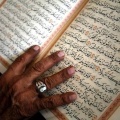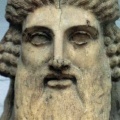On the prohibition of excessiveness in religious matters
It is reported that Ibn ‘Abbas, may Allah be pleased with them both, said:
“When morning came (after) the gathering (in Muzdalifa), the Messenger of Allah, peace and blessings of Allah be upon him, said to me: – Come on, collect (pebbles) for me!
Then I collected small stones for him, and when I put them in his hand, he said: -Yes, like these. And you should beware of showing excesses in religion, for verily, those who came before you perished because of excesses in religion. “
al-Nasai 5/268, Ibn Majah 3029 See Saheeh an-Nasai 3057, Saheeh Ibn Majah 2473
Sheikh-ul-Islam Ibn Taymiyyah said: all kinds of excess, whether in beliefs or deeds. “
See Iqtida syrat al-mustakim, 1/328.
From Ibn Mas’ud, may Allah be pleased with him, it is reported that the Messenger of Allah, peace and blessings of Allaah be upon him, said, repeating his words three times:
“Those who showed excessive perished!” …
This hadith was narrated by Muslim 2670.
Imam al-Khattabi, in his commentary on this hadith, said: “Those who are excessive” are those who go deeply into the question, fall into reasoning with philosophical methods that go deeper into what does not concern them, and that their mind cannot comprehend ”.
See Ma’alim al-Sunan, 4/277.
Imam al-Nawawi said: “Ie. those who fell into excess and overstepped the boundaries in their words and deeds. “
See Sharh Sahih Muslim, 16/220.
Imam al-Nawawi said: “We are talking about those who show strictness in cases where it is inappropriate.”
See Riyadu-s-Salihin, 106.
Imam al-Munawi said: “It was said that these are those who have gone to extremes in their worship, overstepping the boundaries of Sharia and being instigated by the Shaitan.”
See Faidul Qadir, 6/355 .
Sheikh Siddik Hasan Khan said: “This hadith concerns everything that contains excessiveness, be it in worship, in relationships, or in customs. And it also makes no difference whether all this concerns external deeds, deeds of the heart, beliefs or deeds. And if the truth about something is established in the Qur’an and Sunnah, and something else contradicts them, then this also has to do with this hadith and the one who commits such is subject to destruction! And the naming of extremes, excess and excessiveness “death” indicates that all this is prohibited by a categorical prohibition. And excessiveness and excess in everything entail death for those who act in this way! “.
See al-Siraj al-wahhaj, 10/198 .






